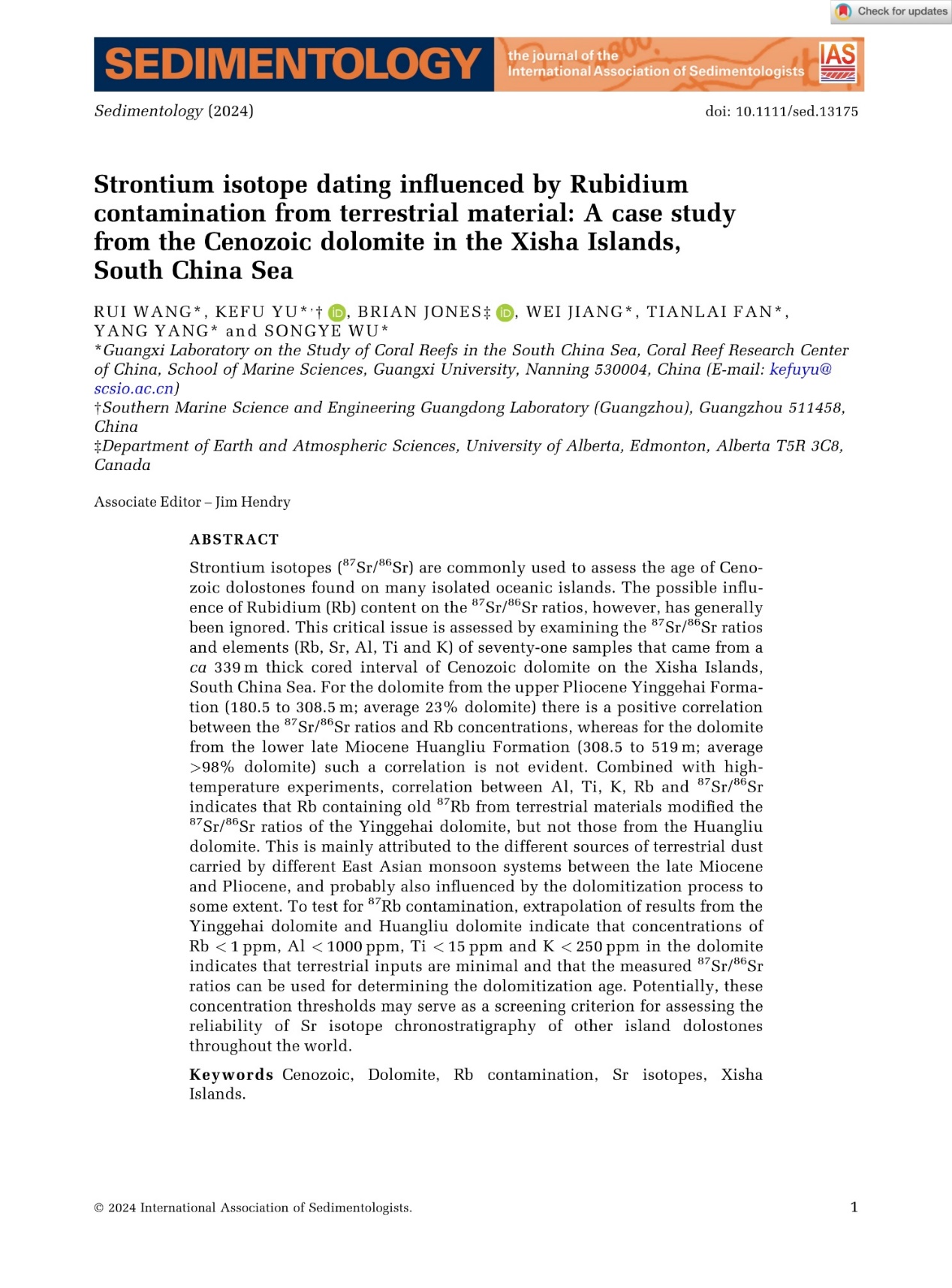Sedimentology paper: New advances in strontium isotope chronology of islands and reefs
Recently, Associate Prof. Wang Rui published a paper "Strontium isotope dating influenced by Rubidium contamination from terrestrial material: A case study from the Cenozoic dolomite in the Xisha Islands, South China Sea" in Sedimentology, one of the top journals in the field of sedimentology. A case study from the Cenozoic dolomite in the Xisha Islands, South China Sea". The important new finding of this paper is that strontium isotope (87Sr/86Sr) dating of dolomites in the islands may be biased due to the influence of radioactive rubidium decay (87Rb to 87Sr) in the land-based dust, and that the reliability of the 87Sr/86Sr dating can be determined to a certain extent on the basis of the elemental (Al, Ti, K) indicators indicative of the land-based dust.
The dolomite problem has plagued geologists for more than two centuries. The Cenozoic island dolomites, which are shallow, early diagenetic and weakly modified, are widely developed in the carbonate platforms in the modern Pacific Ocean, the Caribbean Sea, and the South China Sea, which are considered to be the "natural laboratories" for the study of the dolomite problem. Strontium isotopes (87Sr/86Sr) are commonly used to assess the age of Cenozoic dolostones found on many isolated oceanic islands, but the age of dolomites determined by 87Sr/86Sr is often reversed and difficult to be interpreted, which brings great confusion to geologists. This critical issue is assessed by examining the 87Sr/86Sr ratios and elements (Rb, Sr, Al, Ti and K) of seventy-one samples that came from a ca 339 m thick cored interval of Cenozoic dolomite from the well CK-2 in the Xisha Islands, South China Sea.
The well CK-2 is a nearly 1,000-meter deep drilling well drilled in 2013 on Sumhang Island, Xisha Islands, in which the dolomite (rock) section was cored at more than 90%. The samples used in this study are from the Pliocene Yinggehai Formation (180.5-310.5 m) dolomitized chert (average 25% dolomite content) and the Late Miocene Huangliu Formation (310.5-519 m) massive dolomite (>98% dolomite content) from the CK-2. Meanwhile, we carried out a set of high-temperature synthetic dolomite experiments to qualify the effect of Rb concentration on 87Sr/86Sr, as well as extracted pure dolomite from the Yinggehai Formation using weak acetic acid dissolution. Using 126 rock flakes, 71 Al, Ti, K, Rb and 87Sr/86Sr data and the results of high-temperature synthetic dolomite experiments, a comprehensive analysis shows that there is a significant positive correlation between the 87Sr/86Sr values of dolomite from the Yinggehai Formation and the Rb content, whereas for dolomite from the Huangliu Formation such a correlation is not obvious. The analysis shows that 87Rb from land-sourced dust significantly affects the 87Sr/86Sr values of dolomite from the Yinggehai Formation, but has little effect on the 87Sr/86Sr values of dolomite from the Huangliu Formation. The reason for this difference is mainly due to the different sources of land-sourced dust carried by the East Asian monsoon system during the Late Miocene and Pliocene periods, but it may also be influenced by the dolomitization process to some extent. The qualification of Rb contamination using elemental concentrations shows that when Rb<1 ppm, Al<1000 ppm, Ti<15 ppm, and K<250 ppm are present in dolomite (rock), Rb concentrations in terrestrial dust do not have a significant effect on dolomite87Sr/86Sr values, whose87Sr/86Sr values can be used for determining the age of dolomitization. These elemental concentration thresholds provide screening criteria for assessing the reliability of the strontium isotope chronology of Cenozoic island dolomites, and provide an important reference for constraining the reliability of strontium isotope chronology of ancient dolomites.
